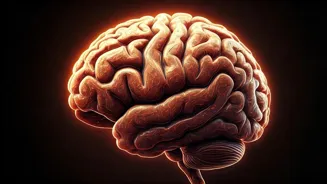Brain-Boosting Beginnings
The brain, much like a muscle, thrives on exercise. Engaging in regular physical activity has a profound impact on cognitive function, leading to improved
memory, focus, and overall mental clarity. These home exercises require minimal equipment and can be integrated seamlessly into any daily routine. By consistently incorporating these activities, individuals can experience a significant boost in their brain health. The routines are designed to stimulate different brain areas, promoting neural connections and enhancing cognitive performance. Starting a brain-boosting exercise journey means investing in a sharper, more focused mind, ready to take on life's challenges.
Aerobic Activities: Run!
Aerobic exercises, often referred to as cardio, are renowned for their positive effects on brain health. Activities like brisk walking, jogging, or cycling increase blood flow to the brain, delivering essential oxygen and nutrients. This increased cerebral blood flow enhances cognitive performance and supports the creation of new brain cells. Aim for at least 30 minutes of moderate-intensity aerobic exercise most days of the week. Consider taking a short walk during your lunch break, jogging around your local park, or using a stationary bike at home. These exercises boost your heart rate and promote improved memory recall, attention span, and overall cognitive function. Consistent aerobic workouts create a healthier brain environment, crucial for long-term cognitive wellness.
Strength Training Matters
Incorporating strength training into your routine is vital for maintaining brain health. Strength training, such as weightlifting or bodyweight exercises like push-ups and squats, stimulates the release of brain-derived neurotrophic factor (BDNF). BDNF is a protein that acts like a fertilizer for the brain, supporting the growth, survival, and maintenance of brain cells. Aim for at least two strength training sessions per week, focusing on compound exercises that work multiple muscle groups simultaneously. Remember to start with lighter weights or fewer repetitions and gradually increase the intensity as your strength improves. Strength training not only boosts physical fitness but also significantly enhances cognitive function, including memory and learning abilities. Make sure you're properly warmed up before lifting and incorporate exercises that challenge your muscles.
Yoga and Meditation
Yoga and meditation are powerful tools for improving brain health and sharpening memory. Yoga combines physical postures, breathing techniques, and meditation to reduce stress and enhance mental clarity. Regular yoga practice increases blood flow to the brain, promoting relaxation and improving cognitive function. Meditation, on the other hand, helps to quiet the mind, reduce stress, and improve focus. Integrating these practices into your daily routine has numerous benefits, including better emotional regulation, improved attention span, and enhanced memory. Allocate some time for yoga or meditation each day. Simple breathing exercises or guided meditations can significantly improve mental clarity and reduce stress. Practicing these techniques leads to increased mindfulness and focus, which contribute to sharper memory and cognitive abilities.
Brain Training Games
Engage your brain with games designed to improve memory, focus, and problem-solving skills. Brain training games, available as apps or online platforms, offer diverse activities, such as memory games, puzzles, and logic challenges. These games challenge your brain and encourage it to make new neural connections, strengthening cognitive function. Spend at least 15-20 minutes each day playing brain training games. Vary the types of games you play to challenge different cognitive abilities, such as memory, attention, and processing speed. Playing these games regularly can lead to improvements in cognitive flexibility, reaction time, and overall mental acuity, making them an effective tool for enhancing brain health.
Get Enough Sleep
Adequate sleep is crucial for brain health and memory consolidation. During sleep, the brain processes and stores information, consolidating memories and clearing out toxins. Aim for 7-9 hours of quality sleep each night. Establish a regular sleep schedule, create a relaxing bedtime routine, and ensure your bedroom is dark, quiet, and cool. Sleep deprivation hinders cognitive function, reducing focus, memory recall, and learning abilities. Improve your sleep habits to ensure that you receive enough rest. Avoid caffeine and alcohol close to bedtime. The improvement in cognitive function is directly related to sleep habits.
Stay Hydrated
Staying hydrated is essential for optimal brain function. The brain is composed of about 73% water and requires adequate hydration to function effectively. Dehydration can lead to reduced cognitive performance, including impaired memory and focus. Drink enough water throughout the day, especially during exercise or warm weather. Carry a water bottle with you, so you remember to drink water regularly, and consider adding fruits or herbs to your water to make it more appealing. Maintaining adequate hydration ensures that your brain receives sufficient oxygen and nutrients to function at its best. Making hydration a priority throughout your day will help enhance brain health, sharpen memory, and improve focus.
Healthy Diet: Fuel Up!
A healthy diet is directly linked to brain health and memory. Foods rich in antioxidants, such as fruits, vegetables, and whole grains, help protect the brain from damage. Fatty fish, like salmon and tuna, contain omega-3 fatty acids essential for brain function and memory. Limit your consumption of processed foods, sugary drinks, and excessive amounts of saturated and trans fats, which can harm brain health. Focus on a balanced diet filled with nutrient-rich foods that support cognitive function. Include healthy fats, lean proteins, complex carbohydrates, and plenty of fruits and vegetables in your diet. A well-balanced diet fuels your brain with the necessary nutrients to enhance cognitive function and promote long-term brain health, helping sharpen your memory.
















